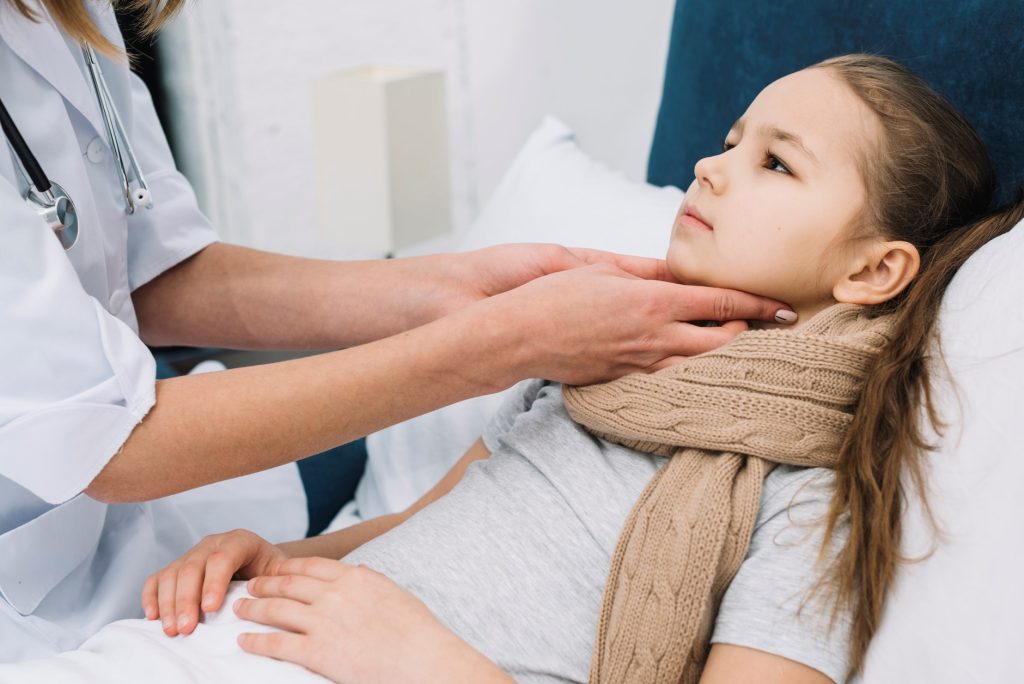Thyroid problems in children can affect growth, energy, and learning. The thyroid is a small gland in the neck. It makes hormones that help control many body functions. When this gland does not work well, children may develop childhood thyroid disorders. These pediatric thyroid issues can be mild or serious. Early detection is important for good health and development.
What Are Thyroid Problems in Children?
Thyroid problems in children happen when the thyroid gland makes too much or too little hormone. This can cause the body to speed up or slow down. There are two main types of thyroid disorders in kids:
- Hypothyroidism: The thyroid makes too little hormone. This slows down body functions.
- Hyperthyroidism: The thyroid makes too much hormone. This speeds up body functions.
Sometimes, children can also have thyroid nodules or swelling in the neck, called a goiter. Each type of thyroid problem can affect children differently.
Common Symptoms of Thyroid Disorders in Kids
Thyroid problems in children can show many signs. However, symptoms may be hard to notice at first. Watch for these common signs:
- Slow or fast growth
- Weight gain or loss without clear reason
- Tiredness or trouble sleeping
- Dry skin or hair loss
- Feeling cold or hot often
- Changes in school performance
- Swelling in the neck
- Constipation or frequent bowel movements
- Changes in mood or behavior
Because these symptoms can be mild, it is important to pay attention to any changes in your child’s health.
Causes and Risk Factors
Several things can cause thyroid problems in children. Some children are born with thyroid issues. Others develop them later. Common causes and risk factors include:
- Family history of thyroid disease
- Autoimmune diseases, like Hashimoto’s or Graves’ disease
- Low or high iodine in the diet
- Previous radiation treatment to the neck
- Certain genetic conditions
- Living in areas with low iodine in water or food
For example, children in some regions may have a higher risk due to low iodine in the soil or water. According to the World Health Organization (WHO), iodine is important for healthy thyroid function.
How Thyroid Problems Are Diagnosed in Children
Doctors use several steps to check for thyroid problems in children. First, they ask about symptoms and family history. Next, they do a physical exam. If needed, they order tests, such as:
- Blood tests to check thyroid hormone levels
- Thyroid-stimulating hormone (TSH) test
- Ultrasound of the neck to look for swelling or nodules
- Other tests if needed, like thyroid scans
Early diagnosis helps children get the right treatment and avoid long-term problems.
Treatment Options for Pediatric Thyroid Disorders
Treatment for thyroid problems in children depends on the type and cause. Most children can manage their condition with help from a doctor. Common treatments include:
- Daily thyroid hormone pills for hypothyroidism
- Medicines to lower hormone levels for hyperthyroidism
- Surgery in rare cases, such as large nodules or cancer
- Radioactive iodine treatment for some older children
Doctors will check your child’s progress with regular visits and blood tests. With the right care, most children lead healthy lives.
Lifestyle Tips and Prevention
While not all thyroid problems can be prevented, some steps may help. Here are some tips for parents:
- Give your child a balanced diet with enough iodine
- Encourage regular check-ups with the doctor
- Watch for changes in growth, energy, or mood
- Share any family history of thyroid disease with your doctor
- Follow the doctor’s advice for medicine and follow-up tests
In some areas, using iodized salt can help prevent thyroid problems. The CDC also recommends regular health checks for children at risk.
When to See a Pediatrician
If you notice any symptoms of thyroid problems in your child, it is best to see a pediatrician. Early care can make a big difference. Seek help if your child has:
- Unexplained weight changes
- Swelling in the neck
- Ongoing tiredness or mood changes
- Problems with growth or school performance
Remember, a doctor can help find the cause and suggest the best treatment.
Consult a pediatric specialist at Maha Hospital for personalized advice on thyroid problems in children.


